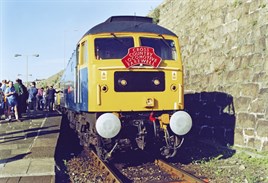Virgin CrossCountry inherited a mixed bag of Class 47s when it won the franchise in 1996. It planned to replace them with diesel electric multiple units (DEMU), which were introduced (the Class 220/221 Voyager fleet) although Class 68s had been mooted (they were going to be diesel locomotives working with coaches).
But they carried on, and worked long-distance VXC trains on a daily basis until August 19 2002, when the operator was finally able to dispense with its locomotive-hauled trains (it continued using ‘47s’ on Summer Saturday trains to Paignton until September 28 2002).
The fleet was initially a mix of locomotives allocated to the ILRA pool. They were Class 47/8s, which had been converted from ‘47/4s’ in the late 1980s by fitting extended long-range fuel tanks, but these locomotives were becoming tired and unreliable. In the late 1990s, failures were a common theme on VXC trains, and the operator regularly used to hire freight traction to cover for the failures. In addition to Class 47s brought in from other companies to cover, including ‘47/0s’ and ‘47/3s’ that had no electric train heat, examples of Class 31, 33, 37, 55, 56, 58, 60 and 73 also made appearances.
The ‘47s’ moved to Toton in their final days as reliability improved. Their sphere of operation included Penzance, Plymouth, Poole, Weymouth, Brighton, Manchester Piccadilly, Liverpool Lime Street, Preston, Derby and Newcastle. Many would give way to an electric locomotive at Birmingham New Street. An increased number of trains ran on Summer Saturdays that saw more ‘47s’ working to the West Country.
Despite the unreliability, withdrawals were rare. The only one to be removed from traffic was 47849 as a result of fire damage. Porterbrook owned the ‘47/8s’. They were later joined by EWS Class 47/7s, hired on a semi-permanent basis.
The VXC Class 47/8 fleet contained: 47805-807/810/812/814/817/818/822/825-829/831/839-841/843-845/847-849/851/853/
854. Of those, 47854 was converted in 1995 from 47674 to replace the fire-damaged 47850. Other than that, the fleet stayed the same.
They were joined from EWS by 47741/747/
750/769 and they all received VT livery, which most of the ‘47/8s’ also gained. VXC returned them to EWS as the need for them ended, with 47769 returned as early as November 2001, 47747 on April 27 2002, 47750 on June 9 and, finally, 47741 on July 13.
Going into the final year, withdrawals began. They were not only due to the fact that VXC was reducing its need for the class, but also because Virgin West Coast had agreed to use 12 Class 57/3s as Thunderbirds, and they were to use redundant ‘47/8s’ as donors. Not all that were chosen were used due to damage and their internal layouts, with 47826/841/844 all rejected (although only 47844 was scrapped).
Slowly through 2002, VXC dispensed with the ‘47s’ that were to be converted. 47845 County of Kent was the first to go, followed by 47827. April saw 47814 Totnes Castle and 47822 withdrawn for conversion, and in June 47806 was stopped. Others that didn’t make it to the final few weeks included 47807 Pride of Vienna, 47817 Institution of Mechanical Engineers, 47831 Bolton Wanderer and 47844. Only the latter didn’t become a ‘57/3’.
Into the final few weeks and as more ‘220s’ and ‘221s’ were delivered, so the number of duties declined to the point where only six jobs remained. These were the: 0600 London Paddington-Manchester Piccadilly, 1115 Manchester Piccadilly-Bristol Temple Meads, 1535 Bristol Temple Meads-Edinburgh Waverley, 0840 Glasgow Central-Penzance (which became the 1131 from Preston), 0846 Penzance-Manchester Piccadilly and 1710 Manchester Piccadilly-London Paddington.
The final week also saw top-and-tailed Class 47/8s running to Bournemouth, with the 0814 Manchester Piccadilly-Bournemouth and 1418 return usually top-and-tailed. Diversions on the final Summer Saturday, August 17, saw many trains top and tailed, running via Nuneaton.
The end came on August 19 (see panel), when 47840 and 47847 hauled the 0846 Penzance-Manchester Piccadilly. They had arrived in Cornwall the previous day on the 1501 from Nuneaton (diverted from Birmingham because of engineering work). The ‘47s’ were two of the five VXC and Porterbrook had repainted into heritage liveries to mark the end of their use.
The repaints were 47826 into InterCity Swallow, 47840 into BR blue, 47847 into large logo blue, 47851 into BR two-tone green and 47853 into XP64 blue with red cab sides. In addition to these 47829 was repainted in police livery.
The final train, which was extended from the usual seven to nine coaches to cater for demand, saw the ‘47s’ work together to Birmingham New Street, where the regular passengers continued to Manchester on a Voyager. Meanwhile, the press and invited guests went to Derby behind the ‘47s’ before going to Toton where there was a line-up of the repainted ‘47s’, joined by 47805 Pride of Toton. And then that was it.
VT retained the ‘47s’ initially; with 47812/839/840/847/851/853 allocated to work Virgin West Coast London Euston-Holyhead trains, while 47805/810/818/826/841/843/848/854 were allocated to become standby locomotives until the full introduction of the Class 57s.
As more new trains, including the ‘57s’ and Pendolinos were delivered, so the need for the ‘47s’ diminished. Riviera Trains snapped up 47805/812/839/843/847/848/853 (which were all also used by Freightliner) while West Coast Railway Company bought 47826/851/854 (the latter the first to move to FGW). Freightliner purchased 47841, while Cotswold Rail bought 47818/828. This left VT with 47840, and this eventually moved to CR for a period before it was donated to the Diesel & Electric Preservation Group.
Today, of those survivors, several are in traffic with Direct Rail Services, while others are still on the books of RT and WCRC. Sadly, the days of several in traffic on service trains are gone.
















Login to comment
Comments
No comments have been made yet.